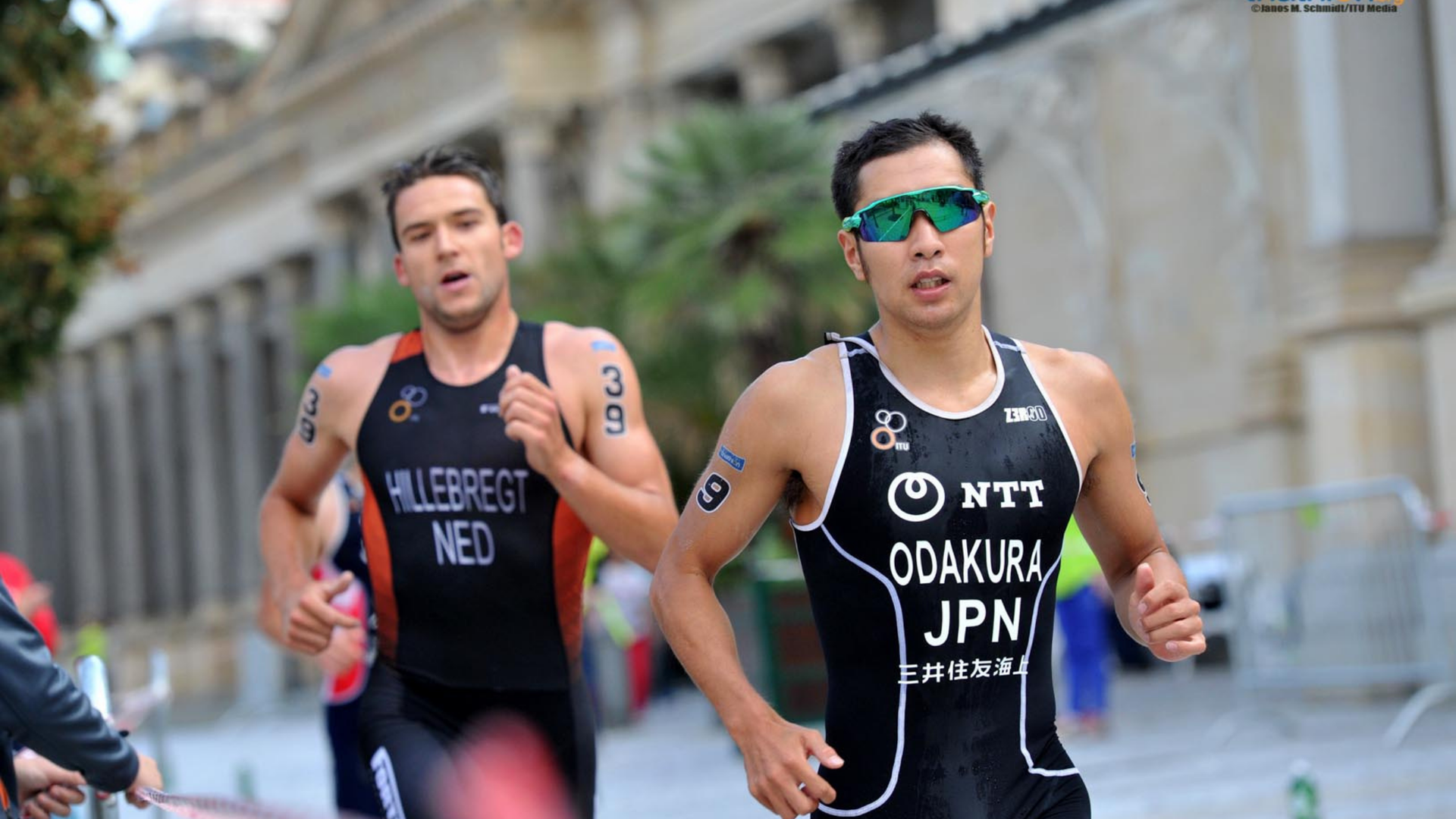How Japanese Corporations Bet Big On Pro Triathletes

(Photo: Rich Cruse/ ITU Media)
For many years, Japanese companies have had a novel approach to supporting the country’s best athletes. Instead of a typical sponsorship contract, like you would find between a bike brand and an athlete in the U.S., Japanese corporations make top athletes in their sports employees. Even in the relatively recent sport of triathlon, some members of Japan’s Olympic team have made it there via this system.
Makoto Odakura is one of them. The 28-year-old is one of Japan’s top male triathletes, with top-20 finishes at WTCS events and a seventh-place finish at the Asian Games back in 2018. As a result, Odakura is also a full-time employee at the Tokyo headquarters of Mitsui Sumitomo Insurance Co., Ltd.—one of Japan’s major insurance firms. As an employee he goes into the office once or twice a week and is paid a monthly salary. His costs for travel, training, equipment, and more are all covered by his employer. Effectively, his main job as an employee at the headquarters of a major insurance company is triathlon. When he retires as an athlete, he’ll have the option to keep working for the prestigious firm as a regular employee if he wants to.

This is in stark contrast to the typical sponsorship system in the United States where Olympic-bound athletes typically get the majority of their funding from the national governing body, USA Triathlon, along with both endemic (within the tri industry) and non-endemic (outside of the sport) sponsorships. When the tenuous year-to-year contracts end, so does the relationship, in most cases.
The Jitsugyodan Sports System
The corporate structure has been the mainstream approach for elite Japanese sports for decades. Called the jitsugyodan (corporate group) system, the approach began in the 1930s as a way of encouraging employee club activities within companies. It rapidly expanded in the lead-up to the 1964 Tokyo Olympics to become the driving power behind Japanese sports.
Mitsui Sumitomo Insurance Company’s triathlon team was launched in 2016, joining the company’s women’s judo and women’s long distance running teams that were founded in 1989 and 1991 respectively. The company’s athletes have won multiple medals at the Olympic and World Championships level. Along with Odakura the triathlete, other Mitsui Sumitomo Insurance employee athletes were named to the women’s soccer and women’s rugby squads for the Tokyo Olympics, and other athletes were chosen for the Paralympic team. All of them operate in an environment in which they can devote themselves completely to their sport.
Identification with the group is an important aspect of life in Japan, and athletes who compete in the corporate uniform are hailed as the pride of the company and cheered on enthusiastically by their fellow employees. “We just had an online sendoff party for Odakura and our other athletes who made the Olympics,” said Eri Otani of Mitsui Sumitomo’s PR department. “As a surprise, we played them a video message of support from the rest of the company’s employees.”
But, she adds, it’s been unusually difficult to show their typical dedication to their Olympic-bound coworkers. “With all the restrictions imposed by the pandemic, it has been a struggle to find ways for them to convey the passion of [the employees’] support for our athletes.”
In a normal year, a group of up to 500 employees wearing matching outfits in the company’s trademark green would turn out at the national championships and other major events to cheer for the three members of the Mitsui Sumitomo triathlon team.
This year, with spectators recently barred from the Tokyo Olympics as a result of the pandemic, the company is working on plans for employees to voice their support through social media. When Odakura hits the water at the Olympics, 6,000 supporters from throughout the Mitsui Sumitomo corporation will be there with him via their screens.
The Supporters’ Association System
Niina Kishimoto, the youngest woman on the Olympic tri squad, was hired by the Fukui Prefectural Sports Association when she graduated from university. Like Odakura this meant she was guaranteed an environment in which she could focus entirely on triathlon. Based in Chiba, just east of Tokyo for her training, Kishimoto travels 300 miles each way to her employer’s offices in Fukui several times a month. The arrangement paid off when she was named to the Olympic team.

Along with her employer and training group, another group backing Kishimoto is her supporters’ association. A common facet of the Japanese sports world, the supporters’ association is made up of family members and friends who came together to help meet her needs as an athlete.
Something like a fan club, the association collects donations to help cover her travel and training costs, and goes to her competitions together to cheer as a group.
Translation: “Today I was named to the Japanese team for the Tokyo Olympics. Through the support of many people I was able to keep pushing forward and never give up. From the bottom of my heart I thank you all for your unwavering support no matter what happened. In the time that’s left I’ll do everything I can to get ready to deliver the best performance possible at the Olympics. Thank you for cheering for me.”
The Good And The Bad
But in the fledgling Japanese triathlete world, at least, these things are still important in helping promising young talent get off the ground. With the Olympic sun just about to rise, Japan’s next generation of triathletes will be there for it with the voices of their families, friends, and co-workers behind them, hoping to see them fly.